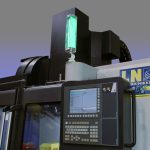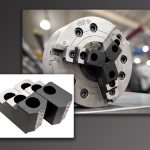Oregon Manufacturing Innovation Center Research and Development adds 26th member
Oregon Manufacturing Innovation Center Research and Development adds 26th member
Scappoose, Oregon – The Oregon Manufacturing Innovation Center Research and Development (OMIC R&D) recently welcomed Caron Engineering as its 26th member.

Scappoose, Oregon – The Oregon Manufacturing Innovation Center Research and Development (OMIC R&D) recently welcomed Caron Engineering as its 26th member. From its Wells, Maine (USA) headquarters, Caron develops advanced retrofit solutions for CNC machines to optimize companies' performance, productivity, and profitability. Caron Engineering serves a wide range of industries including; aerospace and defense, oil and gas, medical, automotive, power generation, utility, heavy equipment, transportation, and appliances.
Founded in 1986, Caron Engineering, Inc. is an employee-owned company with 40 employees, and is well known for keeping current with emerging technologies that serve the metals manufacturing industry. Caron Engineering's expertise revolves around developing optimization solutions for CNC machines so organizations can be more effective and efficient in productivity. Their sensors and monitoring systems collect real-time data and provide advanced analysis of both machine cutting as well as machine mechanics. All Caron products interface directly with the CNC control to make automatic (corrective) adjustments without the need for human intervention. They offer manufacturers a wide array of CNC solutions including machine tool monitoring and breakage detection, adaptive control, automatic tool wear compensation and machine health monitoring and diagnostics, among many other areas.
Craig Campbell, executive director of OMIC R&D said, "We're very excited to have Caron Engineering join the OMIC R&D family. CNC Machining is a critical part of many of our members manufacturing processes. In addition, we utilize CNC machines in our research work. Caron provides a much-needed addition to our "in machine" diagnostic capabilities. We look forward to working with Caron and exploring new R&D projects and collaborations made possible by their membership."
OMIC R&D is the fifteenth innovation research collaborative established with Boeing leadership worldwide, and the first Boeing has sponsored in the United States. Its mission is to bring together manufacturing companies and higher education in an innovative environment to solve the advanced manufacturing challenges facing industry. Faculty and university students undertake "outside-in" applied research to solve real production problems while training the next generation of engineers and technologists to meet the high demand for skilled workers in advanced metals manufacturing. Member companies pool resources and knowledge with researchers to create a highly dynamic and innovative R&D center with access to the most advanced equipment and tools.
Caron Engineering president Rob Caron said, "Caron Engineering's optimization products focus on improving and automating CNC machining processes. A partnership with OMIC R&D offers a unique platform for research and development to expand our product reach and potential while focusing on the overall mutual goal of providing advanced data-driven solutions for metal-cutting manufacturing challenges. We're joining an impressive group of manufacturers who are already members and look forward to being part of this growing partnership organization."
Caron Engineering joins twenty-five other OMIC R&D industry and university members in this unique collaboration: ATI; Blount; Boeing; CG Tech; Daimler Trucks North America; HAIMER, Hangsterfer's Laboratories, Inc.; IMS Software International; Kennametal; Mitsubishi Materials Corporation; Oregon Institute of Technology; Oregon Manufacturing Extension Partnership; Oregon State University; OSG USA, Inc; Portland General Electric; Portland State University; Sandvik Coromant; Schaeffer's; Seco Tools; Silver Eagle Manufacturing; Sugino; Vigor; Walter Tools; WFL Millturn Technologies; and ZOLLER Inc.





